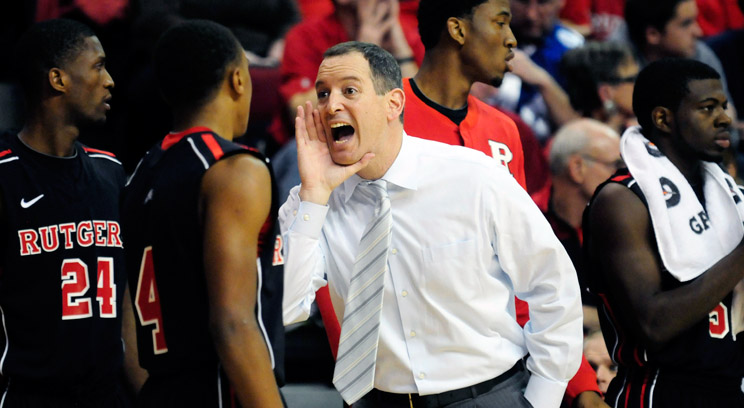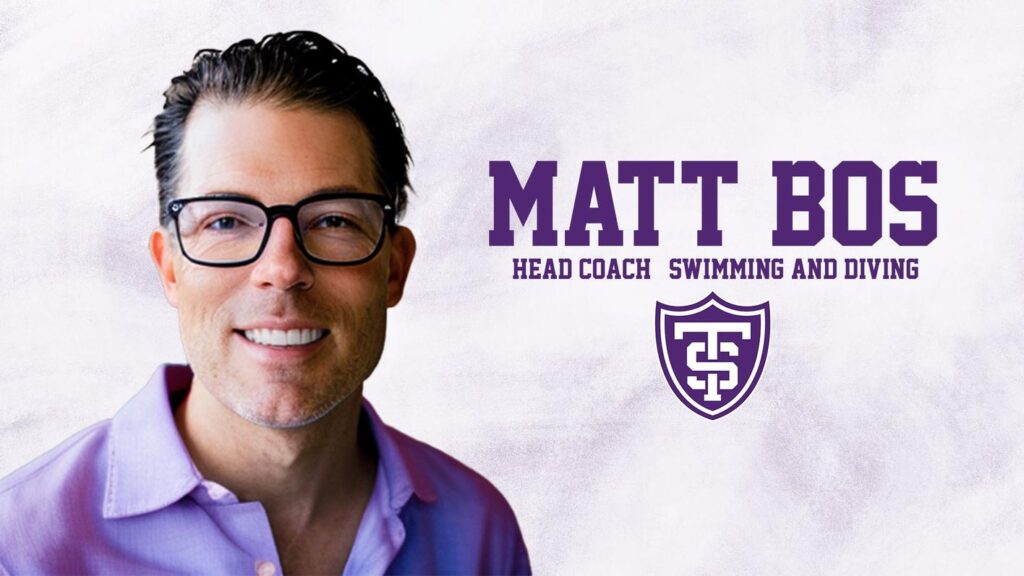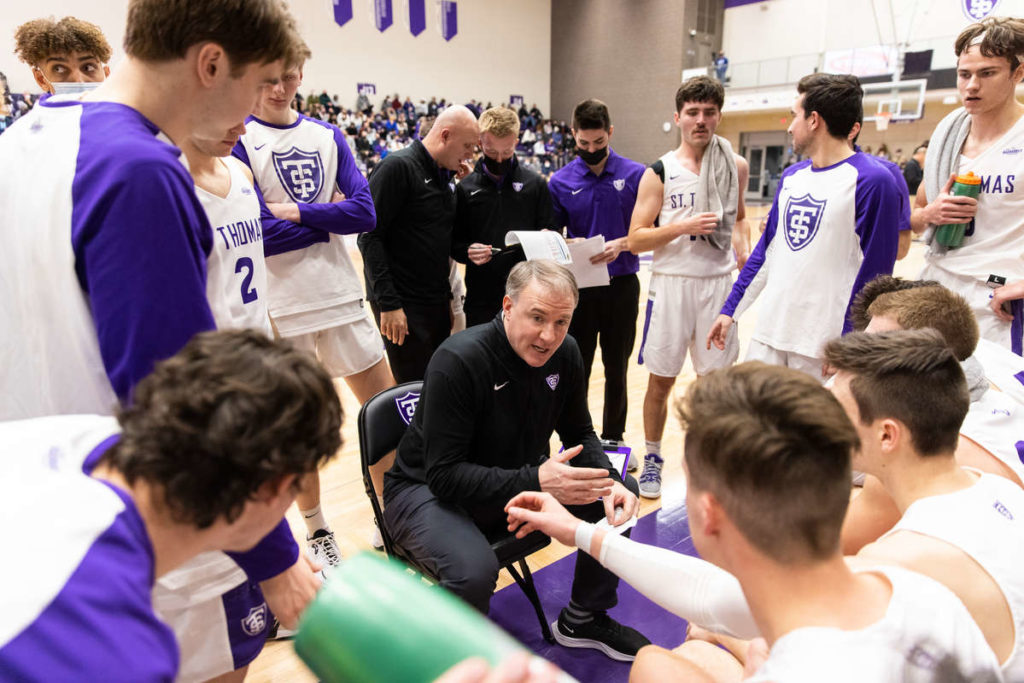With March Madness and the college basketball season coming to an exciting conclusion this week, it was easy to temporarily forget another type of madness that can sadly be a part of sports – the type of madness millions have now witnessed in video footage from Rutgers Men’s Basketball practices. Among other egregious acts, head men’s basketball coach Mike Rice was repeatedly seen pushing and kicking players, throwing basketballs at them, and using derogatory and demeaning language. The videos were outrageous and disgusting, in large part because they run so counter to the messages we hope our student-athletes learn from intercollegiate athletics.

John Tauer, Ph.D.
As the head men’s basketball coach at the University of St. Thomas, I feel blessed and honored to work with an amazing group of players and coaches. This past season, we had a 30-2 record, tied a school record for wins, won an unprecedented 8th consecutive MIAC championship, and advanced to the Division III Final Four for the third time in school history. More important than the records and statistics are the life lessons we aim to teach our players. Some of these lessons include:
- How we respond to failure and mistakes helps us grow, prepares us for adversity, and defines who we are.
- Controlling our emotions is an important skill in life, particularly in frustrating situations.
- We win as a team and lose as a team.
- Intrinsic motivation is better than extrinsic motivation. Approach-oriented motivation is better than avoidance motivation. Finding areas in life that allow us to be passionate and work well with others is invaluable.
In the Rutgers video footage, we see a coach showing his players that failure is not an option, and that mistakes will be punished both physically and verbally. Undoubtedly, players developed a fear of failure (and of their coach). Based on the video and interviews, it is clear Mike Rice’s behavior toward his players was consistently demeaning and aggressive toward his players. How and why were Mike Rice’s actions allowed to occur over time? Understanding the conditions which allowed this hostile environment to take place is important to prevent future situations similar to the one at Rutgers University. Let’s consider the situation from a number of different perspectives.
Why would a coach act like this? Learned Aggression
The research on aggression indicates there are both biological and environmental correlates of aggression. Without knowing Mike Rice’s DNA, it is a safe bet that he learned some of this behavior from other coaches. Rice was a longtime assistant coach, and it seems likely that at least one of his mentors engaged in similar behavior. In working to motivate his players, Coach Rice must have thought they required physical and mental abuse/fear in order to get them to play as hard as he wanted them to play. This approach flies in the face of the research on intrinsic motivation and long-term sustainable performance.
Why would players not turn on their coach? Obedience to Authority
Classic studies on obedience to authority conducted by Stanley Milgram at Yale University in the 1960s demonstrated how quickly and easily average people will obey an authority figure. In one version of Milgram’s study, 65 percent of participants shocked a stranger to a level that could have been fatal (no shocks were actually administered as the stranger was in a different room). The takeaway from this study was that authority figures can abuse their power, yet rarely will others stand up to the person in power.
Players on the Rutgers team undoubtedly disliked how they were treated in practice. However, for non-New Jersey residents, tuition, room and board at Rutgers at a cost of $37,805 per year (or $151,220 over four years), would be a large incentive to stay quiet and avoid risking a scholarship. Furthermore, blowing the whistle on Mike Rice could have led to an ugly situation that, depending on the outcome, could have led to the player leaving Rutgers and struggling to find another school at which to play basketball.
Why would the athletic director not fire the coach immediately upon seeing the video?
Athletic Director Pernetti saw the video yet chose not to fire Mike Rice; rather, he chose to suspend him for three games, fine him and instruct him to attend anger management classes. Pernetti may have thought he could help rehabilitate Rice, but Pernetti also may have been avoiding conflict, hoping to resolve the issue quietly and not draw attention to an athletic program that had more than its share of issues recently.
Why was the public so outraged?
When the video of Mike Rice throwing basketballs at players in practice hit the internet, public outcry was quick to follow. We have an image of how we hope coaches treat players, yet all too often the “Win at all costs” mindset seems to trump all. Why did videos like this not surface 10+ years ago? In part, because videos such as this would be more difficult to obtain and even more difficult to distribute so readily. Mike Rice is not the first coach to treat his players poorly, nor is he the first coach to use fear, vulgar language, and physical abuse as tactics to motivate his players.
Read John Feinstein’s book, A Season on the Brink about Bobby Knight at Indiana University in the 1980s and it is clear Mike Rice is not the first coach to treat his players poorly. Had there been videos of Bobby Knight doing the things Feinstein reported in his book, and an internet to spread those videos like wildfire, my hunch is Coach Knight may have had a more difficult time keeping his job as long as he did in Indiana. Furthermore, I am certain that coaches across the country engage in questionable actions as they seek to motivate, compel and push the right buttons to get their players to play hard and excel. There is certainly a fine line, as athletics are an emotional endeavor, and many coaches walk a tightrope between controlled passion and aggression and uncontrolled physical and mental outbursts. That line can be the difference between an intense, fiery coach such as Rick Pitino winning a national championship with Louisville and an intense, fiery coach such as Mike Rice being fired from Rutgers.
What is the greatest danger stemming from the Rutgers saga? The Fundamental Attribution Error
After the tragic terrorist attacks of Sept. 11, 2001, it was easy to think that if we captured Osama Bin Laden, the world would be safe again. The truly frightening reality was that there were likely thousands upon thousands of individuals who felt the same way Osama bin Laden did about America.
Along these same lines, it feels much cleaner if we believe that now that Mike Rice has been fired, we can go back to believing the “bad coach” is gone and only good ones remain. What is much more frightening is if there are hundreds, or thousands, of Mike Rices out there coaching college and high school sports. Mike Rice learned this behavior from somewhere. It seems unlikely that he is the only one of thousands of college coaches and tens of thousands of high school coaches to employ these types of coaching methods.
The Fundamental Attribution Error (FAE) occurs when we underestimate the power of a situation while simultaneously overestimating the role of one’s personality in discerning the causes of a behavior. In this case, we likely commit the FAE when we overlook the powerful win-at-all-costs mentality that, when combined with the ultracompetitive world of sports helps us understand that Mike Rice was likely innately aggressive as an individual, became more aggressive in part due to what he learned from other coaches , implemented an aggressive coaching style because he believed that behavior motivated players, and did all of this in part due to an environment that allowed and encouraged aggression.
The real shame of the Rutgers basketball saga will be if the public does not engage in a conversation that revisits the true goals of sports, the best practices for teaching and motivating student-athletes, and a broad view of the culture of sports, and why this culture may be a breeding ground for ultracompetitive fear-based motivation that undermines the very goals sports aims to teach. Until that time, unfortunately, the madness of sports will not be limited solely to the month of March.
John Tauer is an associate professor of psychology and head men's basketball coach at St. Thomas.






